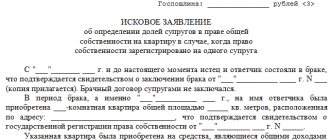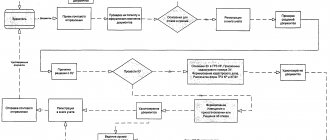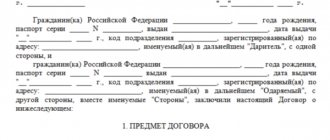The acquisition of real estate is an expensive purchase and a responsible business transaction, errors in the recording of which can be costly for the organization. In this article we will look at the features of accounting in 1C for the acquisition of real estate and its commissioning.
You will learn:
- what document and at what moment to accept real estate on the balance sheet;
- how to formalize the commissioning of real estate before registering ownership;
- when to start calculating depreciation on such property;
- on the nuances of accepting for accounting a fixed asset that has been in operation;
- how to reflect the payment of the fee for state registration of a real estate property and whether it is included in its initial cost;
- how to formalize the transfer of ownership of exploited real estate;
- at what point is VAT accepted when purchasing real estate?
Attention! The VAT rate has been changed from 01/01/2019 from 18% to 20% and from 18/118 to 20/120.
Step-by-step instruction
The organization entered into a purchase and sale agreement with PJSC Safmar Group for the purchase of real estate in the amount of RUB 3,540,000. (including VAT 18%).
Ownership of real estate is transferred after state registration.
On December 3, the supplier PJSC Safmar Group transferred the office premises under an acceptance certificate and issued an invoice. The premises are ready for use and put into operation. The useful life established by the former owner is 600 months. At the time of transfer, the premises had been in use for 100 months.
On December 4, the Organization paid a state fee in the amount of 22,000 rubles. and filed an application for re-registration of ownership.
On December 14, an extract from the Unified State Register of Real Estate was received on the transfer of the right to the property.
In accordance with the accounting policy, depreciation according to accounting and accounting records is calculated using the straight-line method for all fixed assets. Depreciation expenses are included in general business expenses according to the accounting system, and indirect expenses - in the accounting system.
Let's look at step-by-step instructions for creating an example. PDF
| date | Debit | Credit | Accounting amount | Amount NU | the name of the operation | Documents (reports) in 1C | |
| Dt | CT | ||||||
| Acceptance of real estate under the acceptance certificate | |||||||
| December 03 | 08.01.2 | 60.01 | 3 000 000 | 3 000 000 | 3 000 000 | Accounting for a non-current asset | Receipt (act, invoice) - Fixed assets |
| 01.08 | 08.01.2 | 3 000 000 | 3 000 000 | 3 000 000 | Commissioning | ||
| 19.01 | 60.01 | 540 000 | 540 000 | Acceptance for VAT accounting | |||
| Registration of SF supplier | |||||||
| December 03 | — | — | 3 540 000 | Registration of SF supplier | Invoice received for receipt | ||
| Transfer of payment to the supplier | |||||||
| December 03 | 60.01 | 51 | 3 540 000 | 3 540 000 | Transfer of payment to the supplier | Debiting from the current account - Payment to the supplier | |
| Payment of state duty for state registration of property rights | |||||||
| December 04 | 68.10 | 51 | 22 000 | Payment of state duty for registration of property rights | Debiting from a current account – Tax payment | ||
| 26 | 68.10 | 22 000 | 22 000 | Accounting for state duty | Manual entry - Operation | ||
| Transfer of ownership of real estate | |||||||
| December 14 | — | — | Registration of property rights in Rosreestr | Real estate tax: objects with a special taxation procedure | |||
| 01.01 | 01.08 | 3 000 000 | 3 000 000 | 3 000 000 | Transfer of ownership of real estate | Manual entry - Operation | |
| — | — | Changing the fixed assets accounting account in the fixed assets accounting accounts register | |||||
| Acceptance of VAT for deduction on fixed assets | |||||||
| December 30th | 68.02 | 19.01 | 540 000 | Acceptance of VAT for deduction | Generating purchase ledger entries | ||
| — | — | 540 000 | Reflection of VAT deduction in the Purchase Book | Purchase Book report | |||
| Depreciation calculation | |||||||
| January 31 | 26 | 02.01 | 6 000 | 6 000 | 6 000 | Depreciation calculation | Closing the month - Depreciation and wear and tear of fixed assets |
| Recognition of depreciation costs as part of administrative (indirect) expenses | |||||||
| January 31 | 90.08.1 | 26 | 6 000 | 6 000 | 6 000 | Recognition of depreciation costs as part of administrative (indirect) expenses | Closing the month - Closing accounts 20, 23, 25, 26 |
How to reduce personal income tax when selling real estate?
Based on paragraph 5 of paragraph 1 of Article 208 of the Tax Code of the Russian Federation and paragraph 1 of Article 224 of the Tax Code of the Russian Federation, an individual who sold an apartment, house, land plot or shares in the specified real estate is obliged to pay 13% of the income received to the budget. However, there are benefits that will reduce tax amounts. Thus, when selling real estate that has been owned by an individual taxpayer for more than three years, there is no need to pay tax at all (clause 17.1 of Article 217 of the Tax Code of the Russian Federation), just as there is no need to fill out the corresponding tax return (clause 4 of Article 229 of the Tax Code of the Russian Federation). However, in this case, it is important to correctly determine the period of ownership of the property. As a general rule, it is determined based on the date of registration of ownership of property or a share in it (clause 1 of Article 131 of the Civil Code of the Russian Federation, clause 2 of Article 223 of the Civil Code of the Russian Federation), indicated in the certificate of state registration. For a land plot, the period of its ownership by an individual is determined from the moment of registration of the right to a new plot obtained as a result of dividing the original one (Letter of the Ministry of Finance of Russia dated December 17, 2013 N 03-04-07/55742). If the property being sold was received by inheritance, then in order to determine the period of ownership, it should be remembered that the right of ownership arises from the date of death of the previous owner or from the moment of registration of rights to the property, if the right of ownership to the common property arose after the death of the spouse/shareholder. For real estate acquired with the participation of the taxpayer in a housing construction cooperative, the period of ownership is calculated from the moment of payment of the share contribution in full or the date of transfer of the real estate under the acceptance certificate, if this occurred later than the full payment of the cost of the real estate.
Acceptance of real estate under the acceptance certificate
Costs for the acquisition of office space, which will subsequently be taken into account as a fixed asset (FPE), are reflected in account 08.04 “Purchase of fixed assets” (1C chart of accounts).
Real estate objects suitable for exploitation are accepted into the fixed assets regardless of the moment of transfer of ownership rights and are accounted for at their original cost in a separate subaccount to the fixed assets accounting account (clause 52 of the Guidelines for accounting of fixed assets, approved by Order of the Ministry of Finance of the Russian Federation dated October 13, 2003 N 91n, clause 7 PBU 6/01).
The initial cost of the fixed assets is formed based on the actual costs of its acquisition, delivery and bringing the object to a condition suitable for use (clause 8 of PBU 6/01, clause 1 of Article 257 of the Tax Code of the Russian Federation).
Find out more about the formation of the initial cost in BU and NU
In 1C there are two options for registering the acquisition and accounting of fixed assets:
Standard option , which uses documents:
- capitalization of fixed assets - document Receipt (act, invoice) type of operation Equipment ;
- commissioning of OS - document Acceptance for accounting of OS ;
Simplified version , which uses a single document:
- capitalization and commissioning of fixed assets - document Receipt (act, invoice) type of transaction Fixed assets .
Learn more about Options for registering an OS in 1C, as well as the capabilities and limitations of each method
Real estate objects are reflected on the balance sheet of the organization at the time of receipt of the primary documents for its transfer, regardless of the date of transfer of ownership rights (clause 52 of the Guidelines for OS accounting, approved by Order of the Ministry of Finance of the Russian Federation dated October 13, 2003 N 91n).
When registering a property for which ownership has not yet been registered, you can choose any method, but you must take into account other restrictions provided for the simplified option.
In our example, there are no restrictions for using the simplified version, so we will formalize the acceptance of fixed assets for accounting using a single document Receipt (act, invoice) transaction type Fixed assets in the section Fixed assets and intangible assets – Receipt of fixed assets – Receipt of fixed assets.
The header of the document states:
- The method of reflecting depreciation expenses is the method of accounting for the costs of depreciation of fixed assets, selected from the directory Method of reflecting expenses .
In our example, depreciation costs will be taken into account as general business expenses, since the property will be used as an office.
- Assets accounting group - Buildings .
- OS location - location of operation of the OS, selected from the Division directory.
- The Objects are intended for rental checkbox is not selected: in our example, the purchased object will be used for our own needs.
The tabular section indicates:
- Fixed asset is a purchased property that must be created in the Fixed Assets directory .
In the NU for used assets, the useful life is indicated with the exception of the service life of the previous owner (clause 7 of article 258 of the Tax Code of the Russian Federation).
- Service life - useful life (USI) for an object. In this document, only one SPI can be established - the same for NU and BU.
- Accounting account - 01.08 “Fixed assets in the organization”, it must be set manually;
- Depreciation account - 02.01 “Depreciation of fixed assets accounted for in account 01” will be set automatically.
When posting a document, the fixed asset card in the Fixed Assets will be filled out as follows PDF. In this case, the depreciation group will be determined automatically depending on the service life specified in the document.
In the fixed asset card for used fixed assets, in the Depreciation group of the Classification section for this object, you must indicate the depreciation group established by the previous owner (clause 12 of Article 258 of the Tax Code of the Russian Federation). If necessary, you need to adjust the depreciation group of the fixed asset.
The remaining data in the OS card is filled in manually.
Postings according to the document
The document generates transactions:
- Dt 08.04.2 Kt 60.01 - formation of the initial cost of the asset.
- Dt 01.08 Kt 08.04.2 - acceptance of a real estate object into the OS, the ownership of which has not been registered;
- Dt 19.01 Kt 60.01 - acceptance of VAT accounting.
Documenting
The organization must approve the forms of primary documents, including the document on commissioning of the property and the form of the inventory card for further accounting of fixed assets. In 1C, the Certificate of Acceptance and Transfer of a Building (Structure) OS-1a and Inventory Card OS-6 are used.
The form of the Certificate of acceptance and transfer of a building (structure) OS-1a can be printed by clicking the Print button - Certificate of acceptance and transfer of OS (OS-1) of the document Receipt (act, invoice) . PDF
The Inventory card form in the OS-6 form can be printed by clicking the OS Inventory card (OS-6) in the fixed asset card (section Directories - OS and intangible assets - Fixed assets). PDF
Privatization of residential premises is the free transfer into ownership of citizens of the Russian Federation on a voluntary basis of residential premises occupied by them in the state and municipal housing stock, and for citizens of the Russian Federation who have reserved occupied residential premises - at the place of reservation of residential premises.
Currently, the basic principles for the privatization of state and municipal housing stock for social use on the territory of the Russian Federation are established by Federal Law No. 1541-1 of July 4, 1991 “On the privatization of housing stock in the Russian Federation.”
The basic principles of privatization of residential premises are:
- gratuitousness (free transfer);
- voluntary basis (with the consent of all adult family members living together, as well as minors aged 14 to 18 years);
- one-time use (every citizen has the right to acquire ownership free of charge, in the manner of privatization, of residential premises in the state and municipal housing stock for social use once. Meanwhile, minors who have become the owners of the occupied residential premises in the manner of its privatization retain the right to a one-time free privatization of residential premises in houses of the state and municipal housing stock after they reach the age of majority).
Thus, citizens of the Russian Federation occupying residential premises in the state and municipal housing stock, including housing stock under the economic management of enterprises or the operational management of institutions (departmental fund), on the terms of social rent, have the right, with the consent of all adult family members living together, as well as minors aged 14 to 18 years, acquire ownership of these premises on the terms provided for by this Law, other regulations of the Russian Federation and constituent entities of the Russian Federation. Residential premises are transferred into common ownership or into the ownership of one of the persons living together, including minors.
Residential premises in disrepair, in dormitories, in houses of closed military camps, as well as office residential premises, with the exception of the housing stock of state farms and other agricultural enterprises equivalent to them, and the housing stock of stationary social institutions located in rural areas are not subject to privatization. protection of the population.
The transfer of residential premises into the ownership of citizens is carried out by authorized owners of these residential premises by state authorities, local self-government bodies, as well as state or municipal unitary enterprises, to which the housing stock is assigned with the right of economic management, state or municipal institutions, state-owned enterprises, in the operational management of which housing stock was transferred.
The transfer of residential premises into the ownership of citizens is formalized by a transfer agreement concluded by state authorities or local self-government bodies of settlements, an enterprise, an institution with a citizen receiving ownership of the residential premises in the manner prescribed by law. In this case, notarization of the transfer agreement is not required. The contract for the transfer of residential premises into ownership includes minors who have the right to use this residential premises and live together with persons to whom this residential premises is transferred into common ownership with the minors, or minors living separately from these persons, but who have not lost the right to use this residential premises .
The right of ownership to the acquired residential premises arises from the moment of state registration of the right in the Unified State Register of Rights to Real Estate and Transactions with It.
The specified rules for the privatization of residential premises become invalid on March 1, 2013. If the period for free privatization is not extended, privatization of state and municipal property will be carried out only on a reimbursable basis.
Despite the rather long existence of free privatization of residential premises and the scheme of this procedure developed by bodies working to one degree or another in this area, citizens still have problems with the state registration of ownership of residential premises on the basis of a transfer (privatization) agreement. , which subsequently prevent state registration of their rights. First of all, the questions are related to the list of documents required for state registration.
Thus, to carry out state registration of ownership of residential premises on the basis of a privatization agreement, the following documents are required:
1 – application from the owner of the residential premises (or an authorized body) for state registration of the right (if there is no record of the right to this residential premises in the Unified State Register of Rights to Real Estate and Transactions with It and the right arose before the entry into force of the Federal Law of July 21, 1997 No. 122-FZ "On state registration of rights to real estate and transactions with it" and the transfer of the right to premises to the persons specified in the transfer agreement; applications from citizens for registration of the right to residential premises (Article 16 of the Federal Law of July 21, 1997 No. 122-FZ “On state registration of rights to real estate and transactions with it”).
2 – if a representative is acting – a notarized power of attorney (Article 16 of the Federal Law of July 21, 1997 No. 122-FZ “On state registration of rights to real estate and transactions with it”).
3 – a document confirming the owner’s right to residential premises, if there is no record of the right to this residential premises in the Unified State Register of Rights to Real Estate and Transactions with It and the right arose before the entry into force of the Federal Law of July 21, 1997 No. 122-FZ “ On state registration of rights to real estate and transactions with it”; if the right is registered, then the title document does not need to be submitted again; otherwise, if the right to residential premises arose after the entry into force of the Federal Law of July 21, 1997 No. 122-FZ “On state registration of rights to real estate and transactions with it,” it is necessary to register the owner’s right to residential premises, only then alienation is possible.
4 – document confirming payment of the state duty (1000 rubles – clause 22 clause 1 article 333.33 of the Tax Code of the Russian Federation); in the event that several payers who are not entitled to benefits apply, the state duty is paid by the payers in equal shares.
5 – transfer (privatization) agreement - in at least two original copies (Article 18 of the Federal Law of July 21, 1997 No. 122-FZ “On state registration of rights to real estate and transactions with it”).
6 – cadastral passport of the transferred residential premises (or technical passport, if issued before 03/01/2008) - Art. 33 of the Federal Law of July 21, 1997 No. 122-FZ “On state registration of rights to real estate and transactions with it.” Submission of a cadastral passport of a given real estate property is not required if the cadastral passport, plan of this real estate property or other document provided for by Federal Law and containing a description of this real estate property has already been previously submitted and placed in the corresponding file of title documents.
7 – a document confirming that the citizen did not use the right to privatization (issued by the body that carried out the registration of rights before the formation of justice bodies for the registration of rights to real estate and transactions with it). In most cases, this is a certificate stating that the citizen did not participate in privatization, issued by the technical inventory authorities.
8 – if any of the residents of the residential premises refuse to participate in privatization, it is necessary to provide their consent to the privatization of other persons (notarized or executed in the presence of a specialist when accepting documents).
9 - document containing information about persons registered in residential premises (extract from personal account) - Art. 2 of the Law of the Russian Federation of July 4, 1991 N 1541-1 “On the privatization of housing stock in the Russian Federation.”
The documents required for state registration of rights, expressing the content of transactions completed in simple written form, and being the basis for state registration of the presence, origin, termination, transfer, limitation (encumbrance) of rights, are submitted, in at least two original copies, one of of which, after state registration of rights, must be returned to the copyright holder, the second is placed in the file of title documents. For state registration of rights that arose before the entry into force of the Federal Law on the basis of contracts and other transactions, at least two copies of documents expressing the content of the transactions are submitted, one of which, the original, must be returned to the copyright holder after the state registration of rights. An application for state registration of rights is submitted for state registration of rights in a single original copy and after state registration of the right is placed in the file of title documents. Other documents necessary for state registration of rights (with the exception of acts of state authorities and acts of local self-government bodies, as well as acts of courts that established rights to real estate) are submitted in at least two copies, one of which - the original after state registration of rights must be returned to the copyright holder. Copies of acts of state authorities and acts of local government bodies, as well as acts of courts that established rights to real estate, are submitted for state registration of rights in at least two copies, one of which, after state registration of rights, must be returned to the right holder.
The main reasons preventing state registration of ownership of residential premises on the basis of a privatization agreement, and the grounds for suspension (refusal) of state registration in most cases, are the failure of applicants to provide a full package of necessary documents: lack of a cadastral passport, refusal to participate in privatization, document containing information about persons registered in the residential premises, a document confirming that the citizen did not participate in privatization.
In accordance with the order of the head of the Office of the Federal Service for State Registration of Cadastre and Cartography in the Krasnodar Territory, state registration of ownership of residential premises on the basis of a privatization agreement is carried out within no more than five working days.
Chief specialist-expert
state registrar department
registration of rights to residential properties
and non-residential purposes Yu.V. Goltsev
Registration of SF supplier
To register an incoming supplier invoice, you must indicate its number and date at the bottom of the Receipt document form (act, invoice) , then click the Register . PDF
The Invoice document received is automatically filled in with the data from the Receipt document (act, invoice) .
- Operation type code : “Receipt of goods, works, services.”
Regardless of whether the Reflect VAT deduction in the purchase book by date of receipt , when this is done, no entries will be made to accept VAT for deduction.
Deduction of VAT on fixed assets is possible only through the document Generating purchase ledger entries .
Transfer of payment to the supplier
At the time of transfer of the property, an account payable arose to the supplier under Kt 60.01 “Settlements with suppliers and contractors”.
The transfer of debt to the supplier is formalized by the document Write-off from the current account, transaction type Payment to the supplier in the Bank and cash desk - Bank - Bank statements - Write-off section.
This document can be created based on the document Receipt (act, invoice) by clicking the Create based on .
The document states:
- Amount — payment amount in rubles. according to the bank statement.
Postings according to the document
The document generates transactions:
- Dt 60.01 Kt - transfer of payment to the supplier.
Payment of state duty for state registration of property rights
The transfer of ownership of real estate is subject to mandatory state registration (clause 1 of Article 130 of the Civil Code of the Russian Federation, clause 1 of Article 131 of the Civil Code of the Russian Federation, clause 1 of Article 164 of the Civil Code of the Russian Federation, clause 2 of Article 223 of the Civil Code of the Russian Federation).
A state fee is charged for registering property rights (clause 17 of Federal Law dated July 13, 2015 N 218-FZ). Its size is regulated by paragraphs. 22 clause 1 art. 333.33 Tax Code of the Russian Federation.
Payment of the state fee for registration of ownership rights to real estate is documented in the document Write-off from the current account transaction type Payment of tax in the Bank and cash desk section - Bank - Bank statements - Write-off.
The document states:
- Tax - State duty for state registration of rights, restrictions (encumbrances) of rights to real estate and transactions with it ( KBK 32110807020011000110 ).
- Type of liability - Tax ;
- Account - 68.10 “Other taxes and fees”;
- Types of payments to the budget - Tax (contributions): accrued / paid ;
- Budget levels - Federal budget .
Postings according to the document
The document generates transactions:
- Dt 68.10 Kt - the state duty has been paid in connection with the registration of property rights.
Reflection in accounting of state duty for registration of property rights of real estate
In the BU, the reflection of the state duty for registration of property rights depends on the moment of commissioning of the property:
- if the property is not put into operation: the state duty is included in the initial cost of the fixed assets (clause 8 of PBU 6/01);
- if the property is put into operation:
The state duty applies to expenses for ordinary activities (clause 5, clause 7 of PBU 10/99).
In NU, the duty is written off as a lump sum as part of other (indirect) expenses (clause 40, clause 1, article 264 of the Tax Code of the Russian Federation). The amount of the state duty is recognized as expenses on the date of its accrual (clause 1, clause 7, article 272 of the Tax Code of the Russian Federation).
Accounting for state duty costs is reflected in the document Transaction entered manually, transaction type Transaction in the section Operations – Accounting – Transactions entered manually.
State duty accounting:
- Debit - “General business expenses” (indirect cost account).
- Subconto 1 - cost division. To be completed only if records are kept by department. PDF
- Subconto 2 is a cost item for accounting for state duties in NU with the Type of expense - Taxes and fees . With this design of the cost item, expenses for state duty will be taken into account as part of indirect expenses for income tax, as taxes and fees at a time.
- Credit - 68.10 “Other taxes and fees.”
- Amount, Amount NU Dt - the amount of state duty.
Income tax return
In the income tax return, state duty expenses will be reflected only after the Closing of accounts 20, 23, 25, 26 in the Closing of the month .
In the income tax return, the cost of the state duty for registering property rights to real estate is reflected as part of indirect costs in Sheet 02 Appendix No. 2: PDF
- p. 040 “Indirect expenses - total”, including: p. 041 “amounts of taxes and fees...”.
Real estate transactions and the moment of emergence of ownership rights
Today, everyone understands that real estate transactions require mandatory registration with the Federal Service for State Registration, Cadastre and Cartography. The right of ownership of an individual or legal entity arises from the moment of registration of the transaction and transfer of rights in the Unified State Register of Rights to Real Estate and Transactions with It (hereinafter referred to as the Unified State Register of Real Estate). In some cases, the moment when the right arises is different.
For example, in the case of full payment of a share by a member of a cooperative, as well as in the order of inheritance and reorganization of a legal entity (paragraphs two, three, paragraph 2, paragraph 4 of Article 218 of the Civil Code of the Russian Federation, paragraph 4 of Article 1152 of the Civil Code of the Russian Federation), the right of ownership arises with the date of acquisition of such right to real estate. Therefore, if a testator or a reorganized legal entity (predecessor) owned real estate by right of ownership, this right passes to the heir or newly created legal entity, regardless of the state registration of the right to real estate.
The right of ownership of real estate in the case of acceptance of an inheritance arises from the date of opening of the inheritance (Clause 4 of Article 1152 of the Civil Code of the Russian Federation), and in the case of reorganization - from the moment of completion of the reorganization of the legal entity (Article 16 of the Federal Law “On State Registration of Legal Entities and Individual Entrepreneurs” ").
The heir or newly created legal entity is not obliged, but has the right at any time, to register ownership with the registration authority after accepting the inheritance or completing the reorganization. If the ownership right of the predecessor in law was not registered in the Unified State Register, the title documents are documents confirming the basis for the transfer of the right in the order of succession and documents of the predecessor in law indicating the legality of his acquisition of ownership of this real estate. For example, a joint stock company that was created as a result of the transformation of a state (municipal) enterprise in the manner of privatization, from the moment of its state registration in the Unified State Register of Legal Entities, becomes the owner of the property included in the privatization plan (or transfer deed) as its legal successor.
There are features of the moment when organizations acquire ownership of property transferred to them as contributions (contributions) by their founders (participants, members), as well as property acquired by these legal entities for other reasons. For example, if movable property was made as a contribution to the authorized capital before the state registration of a legal entity, the legal entity’s right of ownership of the property arises from the date of such registration. And if movable property is made as a contribution to the authorized capital after the state registration of a legal entity, the ownership of this legal entity arises from the moment the property is transferred to it, unless otherwise provided by law or by the participants of the legal entity (Clause 1 of Article 223 of the Civil Code of the Russian Federation). When real estate is contributed as a contribution to the authorized capital of a legal entity, the ownership of this property arises from the moment of state registration of the right of such legal entity in the Unified State Register.
A citizen or legal entity who is not the owner of real estate, but who in good faith, openly and continuously owns it as his own for fifteen years or other property for five years, acquires the right of ownership of this property (acquisitive prescription) by virtue of clause 1 of Art. 234 Civil Code of the Russian Federation. There was such a case in the practice of law when citizen S. came to the law office for a consultation having already received a negative court decision for him with a request to write a cassation appeal. The claims of citizen S. were based on Article 234 of the Civil Code of the Russian Federation, where he indicated that he had been using his apartment under a lease agreement with an organization for 20 years. We advised that the court reasonably rejected the claim and stated that “possession of property as one’s own means possession not by contract. For this reason, Article 234 of the Civil Code of the Russian Federation is not applicable in cases where ownership of property is carried out on the basis of contractual obligations (rent, storage, gratuitous use, etc.).”
Within the meaning of Art. 225 and 234 of the Civil Code of the Russian Federation, the right of ownership, due to acquisitive prescription, can be acquired for ownerless property. Due to this, a person, before acquiring ownership of property by virtue of acquisitive prescription, has the right to protect his possession. A person who believes that he has become the owner of property due to acquisitive prescription has the right to apply to the court with a claim for recognition of his ownership rights. The defendant in a claim for recognition of property rights due to acquisitive prescription is the previous owner of the property, if he is known. Otherwise, you have the right to apply to the court to establish the fact of bona fide, open and continuous possession of the property as your own during the period of acquisitive limitation. At the same time, you must involve the state registrar as an interested party in the case. Having received a court decision to satisfy the claim for recognition of ownership rights due to acquisitive prescription, you can safely register your ownership rights in the Unified State Register. In our practice, we have brought claims under Art. 268 Code of Civil Procedure of the Russian Federation or Part 3 of Art. 222 of the Arbitration Procedure Code of the Russian Federation on establishing the fact of bona fide, open and continuous ownership of property as one’s own during the period of acquisitive limitation, and a positive decision was the basis for registering property rights in the Unified State Register.
Let us turn to the question of when the right of ownership to an unauthorized construction arises. By virtue of clause 3 of Art. 222 of the Civil Code of the Russian Federation, the right of ownership of an unauthorized construction may be recognized by the court as belonging to a person (copyright holder) who has ownership, lifelong inheritable possession, and whose permanent (indefinite) use is the land plot where the construction was carried out.
If an unauthorized construction is carried out on a land plot that does not belong to the developer, but the necessary permits for its creation have been obtained, the owner of the land plot has the right to file a claim for recognition of ownership of the unauthorized construction. The defendant in such a claim is the developer. In this case, the developer has the right to demand reimbursement of construction costs from the copyright holder.
If an unauthorized construction is carried out on a land plot owned by the developer, but the necessary permits for its creation have not been obtained, the defendant in the developer’s claim for recognition of ownership of the unauthorized construction is the local government body on whose territory the unauthorized construction is located.
If we turn to the practice of law, it is known that the courts, when considering this category of cases, establish whether during the construction of a building there were violations of urban planning and construction standards, whether such a building poses a threat to the life and health of citizens, and appoint an examination for this. A claim for recognition of ownership of an unauthorized construction is satisfied by the court if the only signs of an unauthorized construction are the absence of a construction permit and/or the absence of an act of putting the facility into operation, to obtain which the person who created the unauthorized construction took measures. In all cases of a positive decision, the court establishes that the construction does not violate the rights and legally protected interests of other persons and does not create a threat to the life and health of citizens.
Heirs of such property often have questions. Since the unauthorized construction is not property legally owned by the testator, it is not included in the estate. The heirs who accepted the inheritance - the land plot on which the construction was carried out, have the right to demand recognition of their ownership of it.
And persons whose property rights or legal possession are violated by the preservation of such objects can also go to court to protect their rights on the subject of the claim to eliminate the violation of the right, not associated with deprivation of possession (in accordance with Article 304 of the Civil Code of the Russian Federation). If an unauthorized facility, which is not a new facility, creates a threat to the life and health of citizens, interested parties have the right, on the basis of clause 1 of Art. 1065 of the Civil Code of the Russian Federation, file a lawsuit to prohibit the operation of this facility.
We are often asked the question whether an unfinished construction project as real estate can be recognized as an unauthorized construction. Yes, and all the above-mentioned norms of the Civil Code of the Russian Federation apply to it.
Unlock access to the private part of Clerk with a Premium subscription. Get hundreds of webinars and online courses, unlimited consultations and other proprietary content for accountants.
Hurry up to subscribe with a 20% discount until October 15, 2021. Read more about “Premium” here.
Transfer of ownership of real estate put into operation
Registration of property rights in Rosreestr
If real estate is taxed at cadastral value, then it must be registered in the information register Property tax: objects with a special taxation procedure in the Main section - Taxes and reports - Property tax tab - link Objects with a special taxation procedure.
Transfer of ownership of real estate
After receiving an extract from the Unified State Register of Real Estate on the transfer of ownership of the property, it is necessary to transfer the initial cost of the property from account 01.08 “Real estate objects for which ownership rights are not registered” to account 01.01 “Fixed assets in the organization.”
To do this, we will create a document Transaction entered manually, type of operation Transaction in the section Operations – Accounting – Transactions entered manually.
To correctly generate the Asset Depreciation Sheet , you must also replace the Accounting Account in the information register of the Asset Accounting Account .
New owner or old: who will receive rental payments
Who will get the profit?
In 2015, bankruptcy proceedings began against the capital (case No. A40-211523/2015). Oleg Parfenov was appointed bankruptcy manager of the organization. To pay off debtors, he began to sell off the organization's property. Non-residential premises in the center of Moscow, in which he rented space for a grocery store, were also put up for auction. This property was bought by individual entrepreneur Natalya Timoshenko for 179.9 million. The seller received the full amount from the buyer at the end of January 2021, at which time the parties signed the transfer deed. In addition, the counterparties drew up a letter of guarantee, where they indicated that Rent-Resource would pay Tymoshenko all the money received from the tenant after the state registration of the property for the entrepreneur. The document dealt with the transfer of funds received during the period between the signing of the transfer deed and the making of an entry about the change of owner in the Unified State Register of Real Estate.
But due to shortcomings of Rosreestr, the procedure for transferring rights was delayed and ended only at the end of 2021. During this time, the grocery store paid the landlord 17.5 million rubles. Referring to the terms of the letter of guarantee, Tymoshenko asked the seller to return these funds to her, but he refused. She contacted the ASGM, which recovered the required money in favor of the applicant. But the 9th AAS canceled the act of the first instance, citing the fact that the transfer of ownership of the property has not yet been registered, the lessor is the defendant (clause 60 of the Resolution of the Plenum of the Supreme Court and the Plenum of the Supreme Arbitration Court dated April 29, 2010 No. 10/22 “On some issues arising in judicial practice when resolving disputes related to the protection of property rights and other property rights"). The district court upheld the appeal's conclusion.
The role of the warranty agreement
Not agreeing with this decision, Tymoshenko appealed to the Supreme Court. The applicant in her complaint asserted that the appeal and the 9th AAC and the Moscow District AC ignored the terms of the letter of guarantee, according to which the defendant must return the rent payments received to the plaintiff. The entrepreneur’s lawyer, Roman Igoshin, said at a meeting in the Supreme Court that all expenses for maintaining the property during the disputed period were borne by the tenant: “The defendant never proved what expenses he incurred at that time.” The letter of guarantee, which was one of the main pieces of evidence in this case, also raised questions among the judges of the economic board.
The representative of the bankruptcy trustee, Olga Tishinskaya, assured that the document was drawn up at the request of the buyer: “It was like additional insurance that the property would definitely be transferred.” But, according to her, no one thought that the procedure for transferring rights would drag on for a year. She noted that during this period the defendant paid insurance payments for the property and property taxes. Tishinskaya separately emphasized that the money received from the rental was not used in current activities: all funds were in a special collateral account, as required by bankruptcy legislation.
After listening to all the arguments of the parties, the trio of judges of the Supreme Court, chaired by Olga Kiseleva, retired to the deliberation room and a few minutes later announced the operative part of the decision: the acts of the appeal and the district court were canceled, and the conclusions of the ASGM were left in force. Thus, the new owner of the premises must receive rental payments.
Pravo.ru experts: “In practice, there is no single approach for such situations”
In the situation under discussion, the buyer cannot either actually possess the thing or dispose of it in such a way as to terminate or change the rental legal relationship, explains Dmitry Bogdanov, senior lawyer at CMS Russia CMS Russia Federal Rating. TMT group (telecommunications, media and technology) Pharmaceuticals and healthcare group Antitrust law group (including disputes) Land law/Commercial real estate/Construction group Corporate law/Mergers and acquisitions group Tax consulting and disputes (Tax consulting) group Financial/Banking law group Intellectual property (including disputes) . Maria Suchkova, lawyer Intellectual capital Intellectual capital Federal rating. group Intellectual property (including disputes) group Arbitration proceedings (medium and small disputes - mid market), adds that legal relations between the buyer and the tenant did not arise and could not arise: “The buyer is not the owner of the building until the moment of state registration and cannot dispose of the rights to property, even if there is actual possession.”
The seller remained the owner, and formally, rent payments should go to his property. At the same time, taking into account the fact that he signed a transfer and acceptance certificate with the buyer, his receipt of income from real estate that does not belong to him contradicts the title ownership of the buyer. In such conditions, as well as taking into account the letter of guarantee, the rent must be recovered from the seller (owner) as unjust enrichment.
Dmitry Nekrestyanov, partner Kachkin and Partners Kachkin and Partners Federal rating. PPP group/Infrastructure projects Land law group/Commercial real estate/Construction Company profile
So far, in practice, there has not been a unified approach to solving the issue under discussion. According to Bogdanov, the parties usually agree that during the disputed period the seller remains the recipient of rental payments. As part of a commercial agreement, counterparties can also approve that the seller will subsequently transfer the amounts received to the new owner, the expert says. But from a practical point of view, the right to receive rent can be “delinked” from the moment of registration of the transfer of ownership only if the transaction is completed without complications and within a reasonable time, says Denis Bykanov, partner at MGP Lawyers MGP Lawyers Federal Rating. Group Bankruptcy (including disputes) Group Land Law/Commercial Real Estate/Construction Group Corporate Law/Mergers and Acquisitions.
At the same time, the letter of guarantee that the seller issued to the buyer can be considered not only an acknowledgment of the debt, but also an agreement that rental payments for the disputed period belong to the plaintiff, says partner Precedent Consulting Precedent Consulting Regional Rating. group Arbitration proceedings group Dispute resolution in courts of general jurisdiction Evgenia Zavatskaya.
- Alexey Malakhovsky
- Supreme Court of the Russian Federation
- Economy Board of the Armed Forces
Acceptance of VAT for deduction on fixed assets
When purchasing real estate, VAT is deductible if the following conditions are met (clause 2 of Article 171 of the Tax Code of the Russian Federation):
- OS must be used in activities subject to VAT;
- in stock - correctly issued SF (UPD);
- Fixed assets were accepted for accounting, including included in account 08.04 “Acquisition of fixed assets” (paragraph 3, paragraph 1, article 172 of the Tax Code of the Russian Federation, Letter of the Ministry of Finance of the Russian Federation dated July 4, 2016 N 03-07-11/38824, Letter Ministry of Finance of the Russian Federation dated November 18, 2016 N 03-07-11/67999).
Acceptance of VAT for deduction on purchased real estate is documented in the document Formation of purchase ledger entries in the section Operations - Closing the period - Regular VAT operations.
To automatically fill out the Purchased Assets , you must use the Fill .
Postings according to the document
The document generates transactions:
- Dt 68.02 Kt 19.01 - acceptance of VAT for deduction.
Purchase Book report can be generated from the Reports – VAT – Purchase Book section. PDF
VAT declaration
The VAT return reflects the amount of VAT deducted:
In Section 3 p.120 “Amount of VAT to be deducted”: PDF
- the amount of VAT accepted for deduction.
In Section 8 “Information from the purchase book”:
- invoice received, transaction type code "".
Depreciation calculation
Regulatory regulation
In accounting:
- The cost of fixed assets is repaid through depreciation, starting from the next month after the object is accepted for accounting and ceases to be repaid from the next month after disposal of the fixed assets or full repayment of its cost (clause 17, clause 21, clause 22 of PBU 6/01).
- Depreciation is calculated on the credit of account 02 “Depreciation of fixed assets” in correspondence with cost accounts. In our example, fixed assets are taken into account for general business needs, so the costs of accrued depreciation are taken into account as a debit to the “General business expenses” account.
In tax accounting:
- The cost of an asset is repaid through depreciation, starting from the next month after the commissioning of the asset, regardless of the date of state registration of rights to it, and ceases to be repaid from the next month after disposal of the asset or full repayment of its cost (clause 4 of Article 259 of the Tax Code of the Russian Federation , clause 5 of article 259.1 of the Tax Code of the Russian Federation).
- Accrued depreciation may be recognized as direct, indirect or non-operating expenses in accordance with accounting policies. In our example, depreciation is taken into account as part of indirect (other) expenses at a time on the last day of the accrual month.
Find out more about the features of calculating depreciation in 1C
Accounting in 1C
Monthly depreciation is calculated when performing the Month Closing procedure, the Depreciation and Depreciation of Fixed Assets operation in the Operations – Period Closing – Month Closing section.
In our example, the property was registered as a fixed asset and put into operation on December 3, therefore, depreciation in accounting and accounting records is accrued from January.
Postings according to the document
The document generates transactions:
- Dt Kt 02.01 - depreciation calculation.
Similarly, depreciation is calculated for the following months until the cost is fully repaid. When disposing of fixed assets, depreciation for the last month is accrued in the disposal document, for example, in the document Transfer of fixed assets .
Control
Depreciation calculation:
The monthly depreciation amount in 1C is calculated correctly.
In 1C, the amount of accrued depreciation can be viewed in the report Fixed asset depreciation in the section Fixed assets and intangible assets - Reports - Fixed asset depreciation statement. PDF
Documenting
The organization must approve the forms of primary documents, including documents for calculating depreciation, for example, an Accounting Certificate.
In 1C, you can print a depreciation calculation form using the Help-calculation of depreciation in the Operations section - Closing the period - Closing the month - button Help-calculation - Depreciation.
It presents the calculation of depreciation in BU and NU PDF separately, but with the ability to disclose the amount of depreciation by month of accrual.
New clarifications of the State Property Committee on gratuitous transfer to state property: what has changed?
The new edition of the State Property Committee website contains explanations on the application of legal norms when accepting and transferring property free of charge.
Let's look at what has changed in the clarifications compared to their previous edition, dated 2021.
Section I of the explanations of the State Property Committee
First of all, in the new clarifications from Section I, all references to the norms of Decree No. 294, which expired on November 14, 2019, are excluded
As before, the clarifications noted that the disposal of state property, including its acquisition into state ownership, is carried out in accordance with Decree No. 169 <*>. At the same time, it has now been clarified that when acquiring property for communal ownership free of charge, it is necessary to be guided by the appropriate decision of the local Council of Deputies <*>.
It is indicated that when preparing draft decisions on the disposal of property owned by the Republic of Belarus, one should be guided by Resolution of the Council of Ministers No. 767 <*>.
The clarification that the decision on alienation free of charge from the property of the Republic of Belarus, transfer without transfer of ownership of movable and immovable property is made on the basis of the consent of the receiving party to acquire such property (letter, order or other decision of the authorized body adopted by in accordance with the law). In this case, agreements on the provision of free (sponsorship) assistance, gifts (donations) are not concluded. It is added that in the case of transfer of movable and (or) immovable property owned by the Republic of Belarus, without transfer of ownership, such consent must be provided by the receiving party, into whose economic management (operational management) or gratuitous use the state property is transferred, without approval with a higher management body, unless otherwise provided by paragraph 5 of Decree No. 169, the organization’s charter or a free use agreement <*>.
It is noted that the decision to acquire property free of charge into the ownership of the Republic of Belarus is made on the basis of the owner’s consent to the transfer of such property (letter, order or other decision of the authorized body adopted in accordance with the law). Moreover, when transferring ownership rights without transfer or alienation into communal ownership, as well as acquiring movable property not related to fixed assets into the ownership , the list of documents for making such a decision is not defined by law <*>.
It is provided that when transferring property, including property not related to fixed assets, into state ownership free of charge, the parties have the right to enter into an agreement for the free transfer of property. The transfer is carried out according to the acceptance certificate. At the same time, agreements on the provision of free (sponsorship) assistance, gifts (donations) are not concluded <*>.
Section II of the State Property Committee's clarifications
Section II “On the taxation of gratuitous transfer of property” of the explanations of the State Property Committee is fully set out in a new edition. Now the explanations of the State Property Committee are given on the basis of the letter of the Ministry of Taxes dated 09.09.2020 N 2-1-10/01904.
The section states that for tax purposes, the gratuitous transfer of property (work, services) transferred and accepted in accordance with the law to the Republic of Belarus or its administrative-territorial units represented by government agencies and other legal entities is not recognized as sales <*>. At the same time, it is clarified that in relation to the gratuitous transfer of property , this norm means that the transferring party does not calculate VAT when the procedure for registering the acceptance of property into state ownership, which is regulated by the norms of Decree No. 169, is followed.
When transferring work and services , the procedure for accepting work performed free of charge, services provided by the Republic of Belarus or its administrative-territorial units, similar to the procedure for property established by Decree No. 169, is absent in the legislation. Therefore, the transfer of works and services on the basis of a contract of gratuitous (sponsorship) assistance cannot be considered as a transfer of works and services in accordance with the legislation of the Republic of Belarus or its administrative-territorial units. Consequently, the gratuitous performance (rendering) of work (services) on the basis of a gratuitous (sponsorship) agreement is subject to VAT in the generally established manner.
When transferring property (work, services) free of charge to budgetary organizations of healthcare, education, culture, physical education and sports, you should be guided by subsection. 2.5.5 Art. 115 of the Tax Code as a special norm defining specific recipients for such gratuitous transfer, and, accordingly, when determining tax deductions, apply the norm sub. 24.9 art. 133 NK.
Section III of the State Property Committee's clarifications
Section III “The procedure for preparing documents when transferring property free of charge into state ownership” has not undergone any changes as explained by the State Property Committee.
Read this material in ilex >>*
* following the link you will be taken to the paid content of the ilex service










